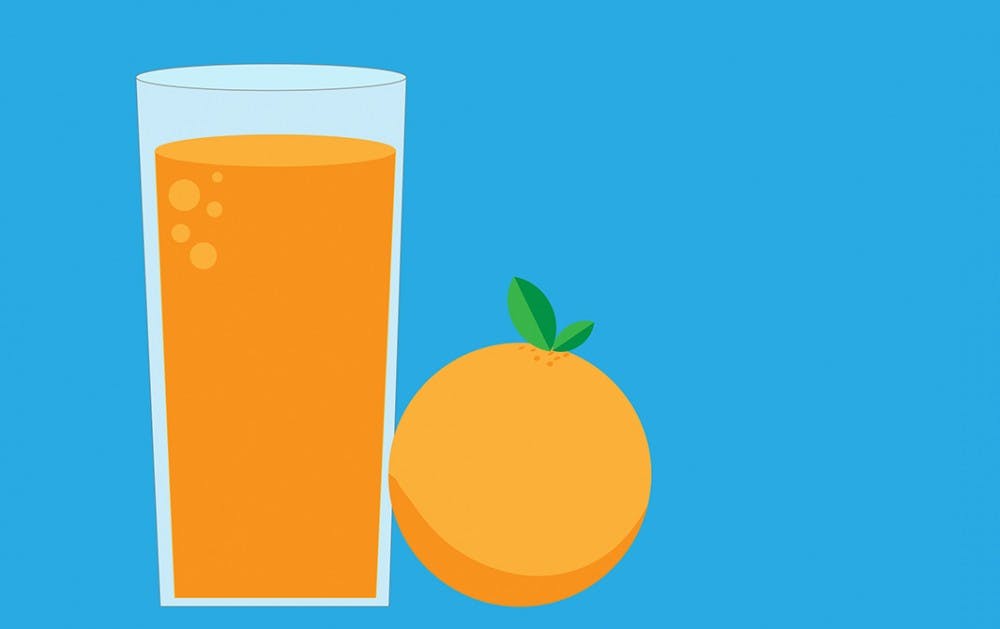Chips, cookies, candy and other unhealthy snacks are common fare for vending machines. But thanks to one ASU student's efforts, residents near ASU's Downtown's Phoenix campus will be able to get freshly squeezed orange juice with the touch of a button.
Erin Washbon, a senior majoring in nutrition, is working with business incubator Systems Imagination to study the way students interact with healthier options through an initiative, called Orange You Glad. Washbon said the initiative will bring two orange juice vending machines close to Arizona Center near ASU's Downtown Phoenix campus.
The goal of the initiative is to bring 100 percent pure, freshly squeezed orange juice to students.
The vending machines, from Singapore-based company i.Jooz, contains whole oranges that the machine squeezes on-site to make the juice. The machines are expected to arrive from Singapore in April. Washbon said she plans to have both machines stationed in the Arizona Center before the end of the semester.
She said the i.Jooz machines cannot be directly on campus because of ASU’s current contract with Coca-Cola.
Compared to store-bought orange juice, freshly-squeezed orange juice has more benefits than just taste, she said. According to Washbon, the vitamin C found in oranges is highly oxidative, so after 24 hours of cutting into an orange, a majority of that vitamin C content is lost.
“Our orange juice machines are trying to give you the freshest product for your health,” Washbon said.
Chris Yoo, CEO of Systems Imagination and an adjunct faculty member of the ASU College of Health Solutions, began this project with Washbon in October 2018.
Yoo said he came up with the idea for the initiative after Washbon, who interned for the company previously, had asked them about what kind of entrepreneurial solutions it could bring to students.
Teaming up with her to bring the idea to fruition made sense because of her education nutrition, he said.
Yoo said after studying the technology that people use everyday in Asia, he found a large and growing interest in health-focused vending machines.
“There’s always ways to learn from how others are using technology,” Yoo said. “There’s a lot of things (in Asia) that we could really benefit from here in the West.”
The machine can hold around 500 oranges, enough for around 120 cups of orange juice, and can squeeze an entire glass of juice in around 30 seconds.
The project plans to include an interactive screen on the machines that allows for feedback and questionnaires while consumers wait for their juice, such as asking users how much they know about the food they eat.
“Our intent is to gather data about how and why these machines can be really beneficial to college campuses like ASU,” Yoo said.
Washbon and Yoo both said they want to increase the public’s understanding of what goes into food and the benefits of eating a more balanced diet.
“I’d like to see more students be more open to healthy food, but also more critical of it,” Washbon said. “I want it to open up the dialogue to allow people to talk more about food in general.”
Rick Hall, the senior director of health innovation programs in the ASU Edson College of Nursing and Health Innovation Hub, clinical professor and the director of the Health Entrepreneurship Accelerator Lab, said he made it his goal to help Washbon acquire the machines and make them available to ASU students.
“Time after time, students have voiced preference for access to healthier options,” Hall said. “The idea is innovative and timely.”
Washbon said the trial-run for the orange juice machines will last around a year, but there are ideas in the works to expand the machines from just orange juice to a bigger concept, such as vending machines that dispense salads, grain bowls or handmade granola snacks.
“It’s such a simple solution, yet it’s something that everyone can benefit from,” Yoo said.
Reach the reporter at eborst@asu.edu and follow @ellieeborstt on Twitter.
Like The State Press on Facebook and follow @statepress on Twitter.
Ellie Borst is the executive editor of The State Press, overseeing the publication and its four departments: online, magazine, multimedia and engagement. She plans to graduate in May 2022 with her master's in legal studies and got her bachelor's in journalism in 2021. Previous roles she has held since joining SP in 2018 include digital managing editor, magazine managing editor, community and culture desk editor, and arts and culture reporter.




